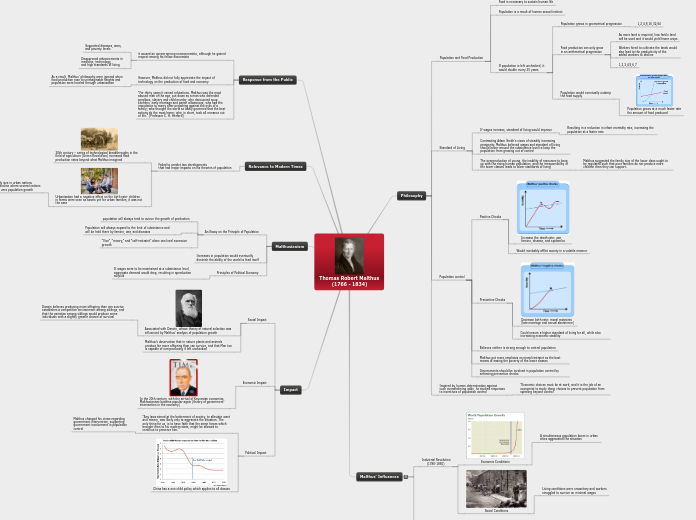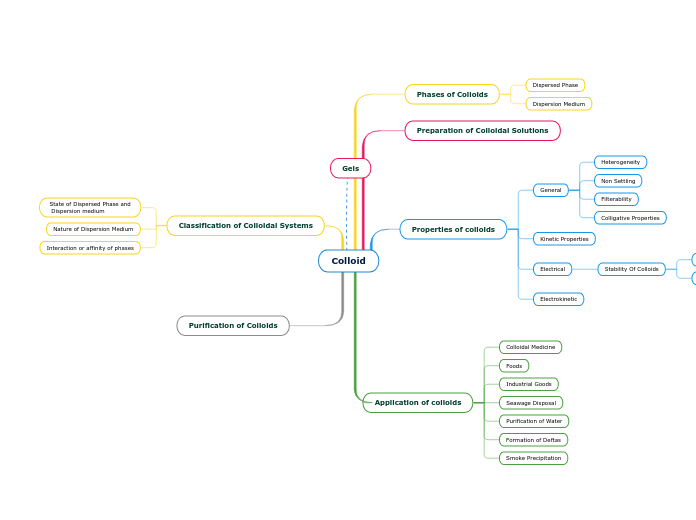Thomas Robert Malthus
(1766 - 1834)
Impact
Political Impact
China has a one child policy which applies to all classes
"Any laws aimed at the betterment of society, to alleviate want and misery, was likely only to aggravate the situation. The only thing for us, is to have faith that the same forces which brought man to his modern state, might be allowed to continue to preserve him."
Malthus changed his views regarding
government intervention, supporting
government involvement in population
control
Economic Impact
In the 20th century, with the arrival of Keynesian economics, Malthusianism became popular again (theory of government intervention in the economy)
Social Impact
Malthus's observation that in nature plants and animals produce far more offspring than can survive, and that Man too is capable of overproducing if left unchecked
Associated with Darwin, whose theory of natural selection was influenced by Malthus' analysis of population growth
Darwin believes producing more offspring than can survive establishes a competitive environment among siblings, and that the variation among siblings would produce some individuals with a slightly greater chance of survival
Malthusianism
Principles of Political Economy
If wages were to be maintained at a subsistence level, aggregate demand would drop, resulting in aproduction surplus
Increases in population would eventually
diminish the ability of the world to feed itself
An Essay on the Principle of Population
“Vice”, “misery,” and “self-restraint” alone can level excessive growth
population will always tend to outrun the growth of production
Relevance to Modern Times
Failed to predict two developments
that had major impacts on his theories of population
Urbanization had a negative effect on the birth rate- children in farms were seen as assets yet for urban families, it was not the case
Average family size in urban nations
continues to decline where several nations
have reached zero population growth
20th century – series of technological breakthroughs in the field of agriculture (Green Revolution) increased food production rates beyond what Malthus imagined
Response from the Public
"For thirty years it rained refutations. Malthus was the most abused man of the age, put down as a man who defended smallpox, slavery and child murder, who denounced soup kitchens, early marriage and parish allowances; who had the impudence to marry after preaching against the evils of a family; who thought the world so badly governed that the best actions do the most harm; who, in short, took all romance out of life." (Professor C. H. Herford)
However, Malthus did not fully appreciate the impact of technology on the production of food and economy
As a result, Malthus' philosophy were ignored when
food production rose to unimaginable heights and
population were leveled through urbanization
it caused an uproar among noneconomists, although he gained respect among his fellow economists
Disapproved advancements in
medicine, technology,
and high standards of living
Supported diseases, wars,
and poverty levels
Malthus' Influences
Malthus’s thoughts and writings were influenced by the economic conditions in Britain
Napoleonic War
(1803-1815)
Situations became crowded as immigrants from the
continent flocked Britain urban cities
The amount of resources spent on war added to
the difficulty of the British working class
Industrial Revolution
(1780-1850)
Social Conditions
Living conditions were unsanitary and workers
struggled to survive on minimal wages
Economic Conditions
A simultaneous population boom in urban
cities aggravated the situation
Philosophy
Inspired by human determination against
such overwhelming odds, he studied responses
to incentives of population control
"Economic choices must be at work, and it is the job of an economist to study those choices to prevent population from spiraling beyond control"
Population control
Governments should be involved in population control by enforcing preventive checks
Malthus put more emphasis on moral restraint as the best means of easing the poverty of the lower classes
Believes neither is strong enough to control population
Preventive Checks
Could ensure a higher standard of living for all, while also increasing economic stability
Decrease birth rate: moral restraints
(late marriage and sexual abstinence)
Positive Checks
Would inevitably afflict society in a volatile manner
Increase the death rate: war,
famine, disease, and epidemics
Standard of Living
The overproduction of young, the inability of resources to keep up with the rising human population, and the irresponsibility of the lower classes leads to lower standards of living
Malthus suggested the family size of the lower class ought to be regulated such that poor families do not produce more children than they can support.
Contrasting Adam Smith’s views of steadily increasing prosperity, Malthus believed wages and standard of living should hover around the subsistence level to keep the population from growing out of control
If wages increase, standard of living would improve
Resulting in a reduction in infant mortality rate, increasing the population at a faster rate
Population and Food Production
If population is left unchecked, it
would double every 25 years
Population would eventually outstrip
the food supply
Population grows at a much faster rate
the amount of food produced
Food production can only grow
in an arithmetical progression
1,2,3,4,5,6,7
Workers hired to cultivate the lands would
also lead to the productivity of the
added workers to decline
As more land is required, less fertile land
will be used and it would yield fewer crops
Population grows in geometrical progression
1,2,4,8,16,32,64
Population is a result of human sexual instinct
Food is necessary to sustain human life









